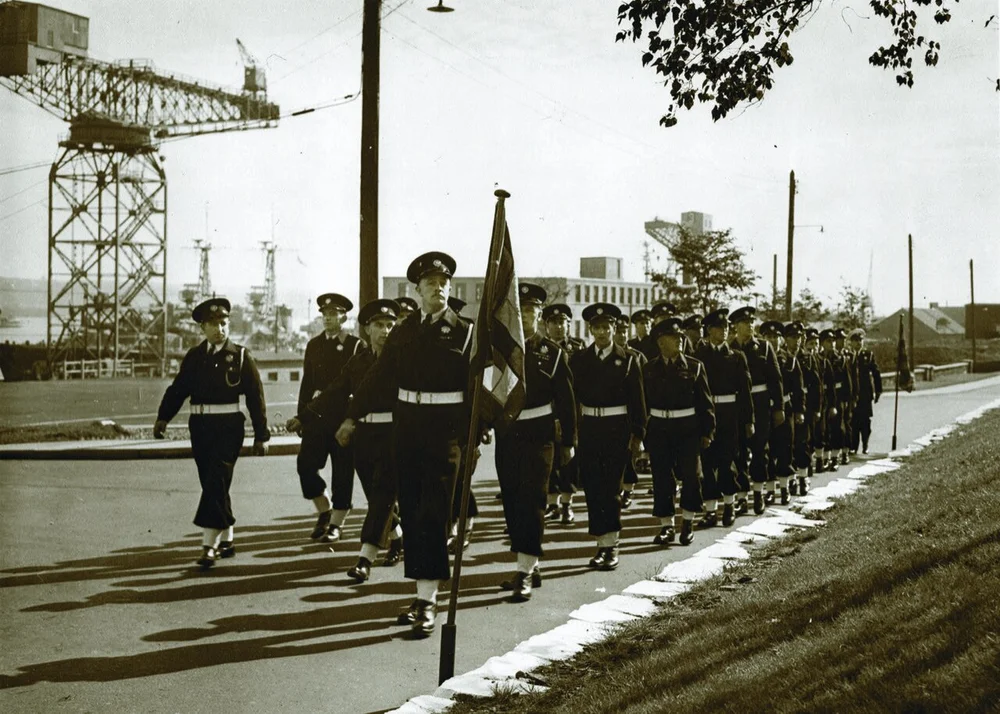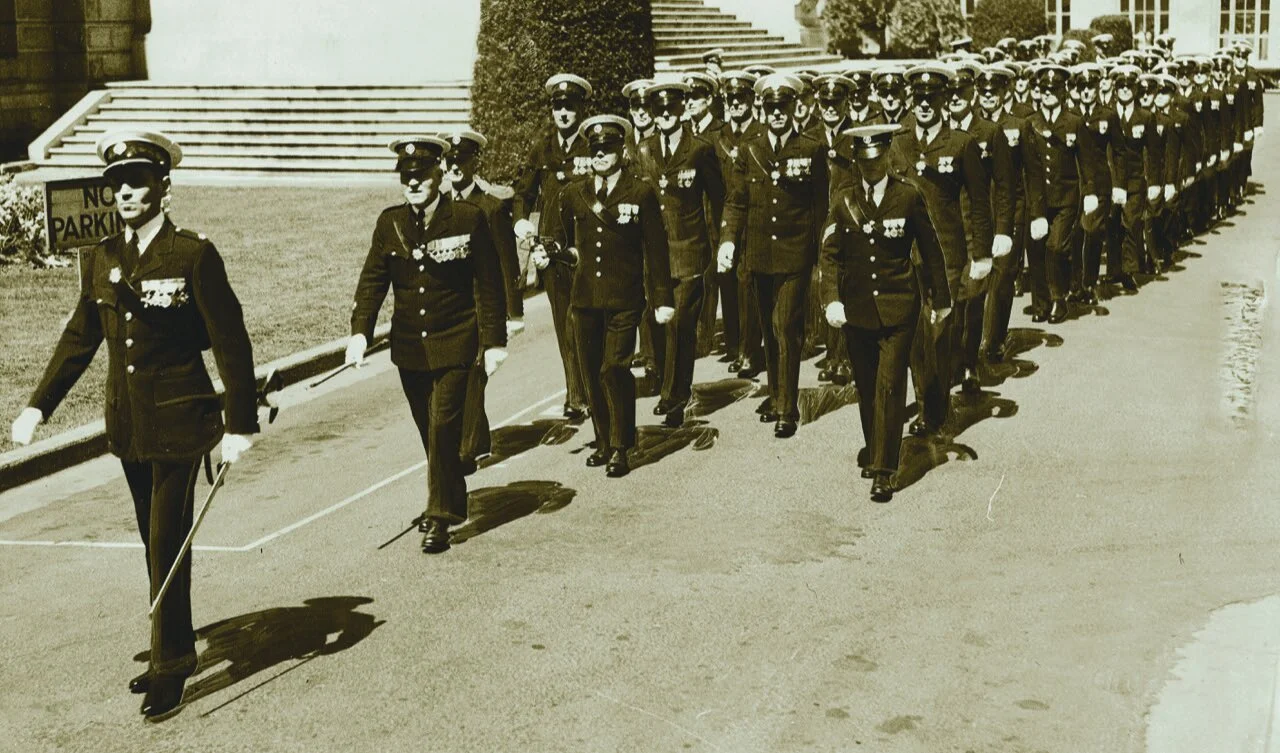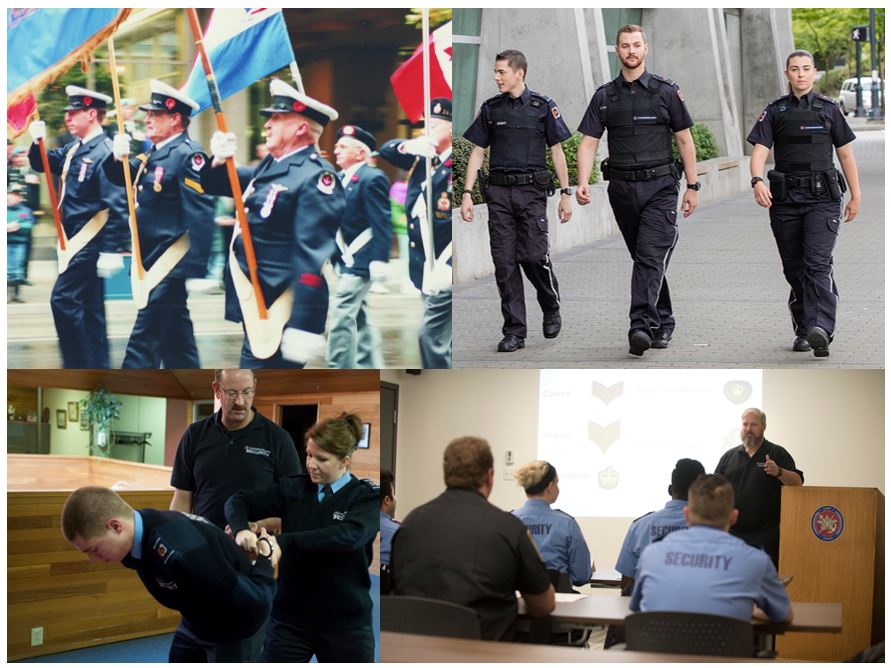The Canadian Corps of Commissionaires: A Legacy of Service and Security
August 1, 2024
by

Anyone who has visited a federal or military building in Canada will immediately see security members dressed in a blue or white uniform. While many visitors might assume that these guards are federal employees or police officers, in reality, they are Commissionaires.
Officially known as the Canadian Corps of Commissionaires, this uniquely Canadian, private, not-for-profit organization was established in 1925 to provide meaningful employment to military and RCMP veterans and to deliver top-tier security services across Canada. The story of the Corps, as its generally referred to, is one of historical significance and military tradition.
Historical Roots: From the Crimean War to Canadian Soil
Its origins date back to mid-19th century Great Britain. Following the Crimean War (1853-1856), a significant number of British veterans returned home, many of whom were wounded and found themselves without adequate support or employment opportunities. The British government lacked a robust social safety net, leaving these veterans to fend for themselves. In response to this critical need, Captain Sir Edward Walter, a retired army officer, sought to address the issue of unemployment among veterans. Recognizing the discipline, professionalism, and training inherent in soldiers, Walter envisioned an organization that would utilize these qualities for civilian security roles.
In 1859, Walter established a small security firm employing seven disabled veterans to provide protection and oversight for local businesses in London. He drew inspiration from the French "commissionnaires," who were responsible for assisting guests in hotels with their baggage and errands. To distinguish his organization from the French model, he named it the “Corps of Commissionaires” (anglicizing the term by removing the second ‘n’). This name reflected both the military roots of its employees and the intended role of the organization.
And while its important to note that these type of security firms are not unique (another example is the Italian IVU/Dell’Urbe) the corps of commissionaires has been one of the most successful examples.
The Canadian Expansion
The concept of the Corps eventually crossed the Atlantic and reached Canada. Prince Arthur, Duke of Connaught—who had witnessed the success of the British Corps—advocated for a similar organization in Canada. This vision became a reality in 1925, when five prominent Montreal lawyers founded the Canadian Corps of Commissionaires with the goal of providing employment for returning World War I veterans.
The initial success of the Canadian Corps led to the establishment of additional units in Toronto and Vancouver. By the end of 1927, the organization had expanded to Vancouver, and its presence continued to grow rapidly. This expansion was driven by the desire to create a national organization that could support veterans across the country.

The Formation of a National Organization
Despite its early successes, the Canadian Corps faced challenges in achieving national cohesion. By the mid-1930s, the effectiveness of the Corps was diminishing due to a lack of coordination among the Montreal, Toronto, and Vancouver groups. In response, the
In 1937, Major General W.B.M. King was appointed as the first national president, bringing much-needed leadership and direction to the organization. Under his guidance, the Corps expanded its operations and established new units in cities such as Hamilton, Windsor, Calgary, and London. This expansion was further accelerated in the early 1940s, with new operations launching in Winnipeg, Edmonton, Halifax, and Ottawa.
The War Years and Post-War Growth
World War II brought about significant changes and challenges for the Canadian Corps. As the war neared its end, the newly formed Department of Veterans Affairs recognized the Corps as an essential civilian employer for returning veterans. This recognition led to the implementation of the Right of First Refusal (RFR) policy, which required federal government bodies to obtain security services from the Corps. This policy, unique to the Canadian Corps, was never achieved by its British counterpart and solidified the Corps’ position as a vital security provider giving it a monopoly like advantage .
The post-war period saw a surge in the number of veterans seeking employment. The Corps played a crucial role in providing jobs for these individuals, including notable figures such as Collin Borrow, a Victoria Cross winner; Hari Singh, one of the first Sikhs to serve in the Canadian military; and Oren Foster, who was awarded the MBE for his bravery during the war. The caliber of individuals who joined the Corps underscored its commitment to service and excellence.
Adapting to Modern Needs
The Canadian Corps of Commissionaires continued to evolve throughout the latter half of the 20th century and into the 21st century. As the organization grew, it adopted new technologies and expanded its range of services to meet the changing needs of its clients. By 1982, the Canadian Corps had grown to more than 10,000 employees, nearly doubling the size of its British predecessor.
In response to the increasing demand for security services after the September 11 attacks, the Corps began accepting civilians to meet staffing needs. While a significant proportion of its members are still veterans, the Corps now employs individuals from various backgrounds, reflecting the evolving nature of the security industry.
Services and Capabilities

Today, the Canadian Corps of Commissionaires stands as one of the largest and most respected security providers in Canada, with over 23,000 employees operating in 1,200 communities across the country. The Corps offers a wide range of services compared to most US and international firms, including:
- Security Consulting: Providing advice on security strategies and risk management.
- Security Guarding: Trained security personnel
- Security Technology and Cybersecurity: Implementing advanced technologies to protect digital and physical assets.
- Mobile Patrol: Conducting regular patrols to deter and respond to security threats.
- Alarm Response: Responding promptly to alarm activations and emergencies.
- Bylaw Enforcement: Enforcing local bylaws and regulations.
- Non-Core Policing: Providing supplementary support to law enforcement agencies.
- Home Watches: Monitoring residential properties for security purposes.
- Fingerprinting: Offering fingerprinting services for background checks and identification purposes.
- Pre-Employment Screening: Conducting background checks to ensure the suitability of job candidates.
Legal Powers and Limitations
In Canada, security guards, including Commissionaires, have specific legal powers and limitations. While they are not part of the local police force, they can perform certain duties, such as asking individuals to leave private property and making arrests for specific offenses. Security guards are generally prohibited from carrying firearms, with exceptions made for roles such as cash-in-transit security.
Commissionaires are equipped with tools like batons and handcuffs but must adhere to strict regulations regarding the use of force. They can conduct searches of individuals and their belongings only with consent, ensuring that their actions remain within legal boundaries.
Conclusion: A Tradition of Excellence
For over 90 years, the Canadian Corps of Commissionaires has upheld a proud tradition of service and dedication. With a rich history rooted in military tradition and a commitment to providing meaningful employment to veterans, the Corps continues to be a cornerstone of Canada's security landscape.
From its origins in 19th century Britain to its expansion across Canada, the Canadian Corps of Commissionaires has adapted to changing times while remaining true to its founding principles. Its extensive network of professionals, its diverse range of services, and its unwavering commitment to excellence make it a vital institution in Canadian society. As it looks to the future, the Corps remains dedicated to its mission of serving Canada and its veterans with honor and integrity.
Copyright by Vigiles Analytica. All rights reserved. ©2025
